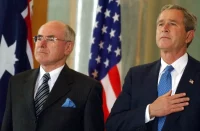Democracy American-style is such a precious commodity that they don’t give it away. Of course, the Americans may be generous at first and let you have it on credit. But eventually the debt has to be be repaid.
US Congressman Dana Rohrabacher visited Iraq and met with local Prime Minister Nouri al-Maliki. He urged Baghdad to pay back part of what Washington spent to bring democracy to the country. By that he meant the cost of the war that George Bush started in March 2003 to overthrow Saddam Hussein’s regime.
As Rohrabacher sees it, America did Iraq such a great favor that it is time for Iraq to remember what it owes. Especially since America is currently in a crisis, and Iraq is a potentially wealthy. “Once Iraq becomes a very rich and prosperous country,” he said at a press conference in the US Embassy in Baghdad, “we would hope that some consideration be given to repaying the United States some of the mega-dollars that we have spent here in the last eight years.”
That is truly a universal scheme, and it is not intended just for Iraq. Rohrabacher is convinced that the principle of recovering US costs for “establishing democracy” may well be applied to Libya as well (where NATO is now carrying out an operation to overthrow Muammar Ghadafi’s regime). And they may set their sights on Syria also. And don’t forget about Serbia: let the Serbs pay for their “democratization,” which was established by bombing Belgrade and other cities in the country. That would be absolutely proper from Rohrabacher’s point of view: a blessing like democracy isn’t free; you have to pay for it.
Americans’ cynicism is simply amazing. They mold the world into their own image and for their own selfish interests, brutally eradicating tens or even hundreds of thousands of people while simultaneously trampling what remains of international law and undermining the dollar-based global financial system—and yet they still demand that the countries they have democratized (conquered) pay full compensation for their “good deed.” The democratization process thus pays for itself completely and immediately: there is no need to wait until American business begins to extract revenues from the democratized countries. Let the countries so favored reimburse the American Army’s full cost of establishing democracy.
Next, I think the Americans will take the final step—they will simply force the countries that they only intend to democratize to pay for their democratization in advance. For example, they will require require Syria to deposit an amount in the US treasury to cover the cost of intervention by an “international coalition” a year before it takes place. The Americans themselves, of course, will calculate the amount, and it will go to the Pentagon (after all, “international coalition” is just a euphemism for American intervention). Then “democratization” will operate like a conveyor belt—until the institution of total world domination.
Incidentally, Rohrabacher is not some crank in the American establishment who blurts out anything. Therefore, his words should be taken seriously: “Rohrabacher’s scheme” has the potential to become official Washington doctrine.
Remember that Rohrabacher gained fame as a speechwriter for Ronald Reagan by coining the term “Evil Empire.” And he also came up with the well-known elegant expression that Reagan loved to use in negotiations with Gorbachev: “Trust but verify.”
And apparently Rohrabacher’s new scheme—”compensation for democratization”—will be warmly welcomed in America. Cries plainer than Rohrabacher’s have already been heard there.
For example, potential presidential candidate billionaire Donald Trump recently told a crowd in Las Vegas that he would do what they did in the old days: “When you won the war, it was yours… So I said, ‘We go in, we take the oil.'” If the United States doesn’t do it, he said, “Iran takes over the oil. Iran becomes a force like never before in history. They then take over Saudi Arabia…and Iraq…” He said he is only interested in Libya for one thing: its oil. Well, it is shocking, of course; but he was even more open about it than Rohrabacher.
By the way, the Americans have already begun to wring repayment for some debts out of Iraq. On April 30, the Iraqi parliament agreed to pay a few hundred Americans $400 million for being held hostage by Saddam Hussein’s soldiers during Iraq’s invasion of Kuwait. Why it was that those “hostages” remained safe and sound and how the amount of damage was calculated was not reported.
But the Americans have so far paid Iraq NOTHING—unless, of course, the “democracy” they gave Iraq in 2003 is considered an advance. They not only did not pay, they stole at least $6.6 billion from Iraq. That came to light quite recently, when the largest currency theft in American history was discovered.
After the U.S. invasion of Iraq in March 2003, the US Congress decreed the return of about $61 billion. Incidentally, the “generous” Americans represented it as an unprecedented grant to the young Iraqi government. In reality, the money belonged to Iraq: it was the proceeds from the sale of Iraqi oil, Saddam Hussein’s seized assets and excess proceeds received as a result of the UN oil-for-food program.
An audit found that $6.6 billion of the $12 billion sent to Baghdad in 2004 had vanished. The Pentagon admitted that this huge sum had apparently been stolen. Thus, the Americans who appropriated Iraq’s money for themselves (ostensibly temporarily—in order to later help the “young Iraq”) did not return it to its rightful owner. But they are demanding “compensation for establishing democracy” (per Rohrabacher) from Iraq. Or simply all of Iraq’s oil (as Trump said).
Meanwhile, the US benevolence (in the sense of “establishing democracy”) resulted in the following damage for Iraq.
As reported by Wikipedia, the casualties among Iraqi civilians during the war are unknown and cannot be accurately quantified. Published estimates of the dead tend to vary by hundreds of thousands. Here are a few estimates:
Opinion Research Business named the largest number in August 2007. The company estimates that as of that date there had been from 733,158 to 1,446,063 Iraqi civilian casualties. The figures were adjusted in January 2008 based on additional data and ranged from 946,000 to 1,120,000 fatalities. The technique used to arrive at the estimates consisted in querying 2,414 randomly selected adults across the country about how many people had been killed in their family (household). It was found that 20.2% of families had had members killed, and the average was 1.26 people per family. These data were extrapolated to the entire country using the 1997 census, according to which Iraq had 4.05 million families. This technique, however, resulted in an overestimate because the probability of finding a respondent from a large family is higher than from a small one, and the probability of a member of a large family being killed is also higher than for a small family. Although data on family size were collected during the survey, corrections for family size were not made when the results were published.
The Iraq Body Count project estimates that 89,612 to 97,840 civilians had been killed in Iraq as of December 12, 2008. That figure is very low because it is based solely on media reporting.
According to a study Iraq’s Ministry of Health conducted for the World Health Organization, the number of civilian casualties from the beginning of the war until June 2006 ranged from 104,000 to 223,000 people.
A study by US public health experts at Johns Hopkins University in Maryland (published in October 2004) concluded that more than 100,000 people had been killed in Iraq since the war began in 2003. The report was published on the Internet by The Lancet medical journal.
The American headquarters estimated losses among insurgent and terrorist groups by the fall of 2007 at more than 19,000 people killed. On September 23, 2010, the WikiLeaks website, which specializes in disseminating classified information, released about 400,000 documents related to US military operations in Iraq. According to them, civilian casualties in Iraq during the war came to about 66,000. Militant losses were about 24,000.
And those are only the HUMAN losses. Economic damage to Iraq caused by the aggression of the United States and the “international coalition” is much more difficult to estimate.
And for this “good deed” the Americans are demanding compensation from Iraq?!
Source: New Eastern Outlook














Comments